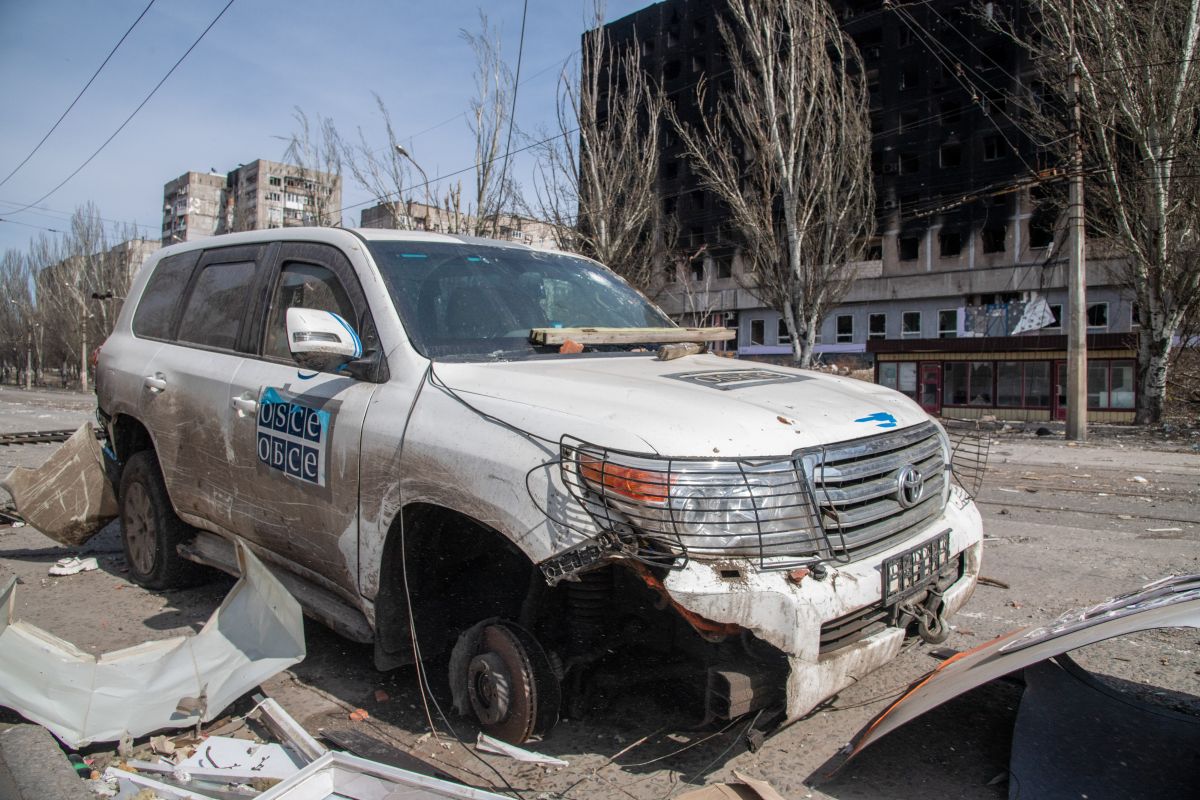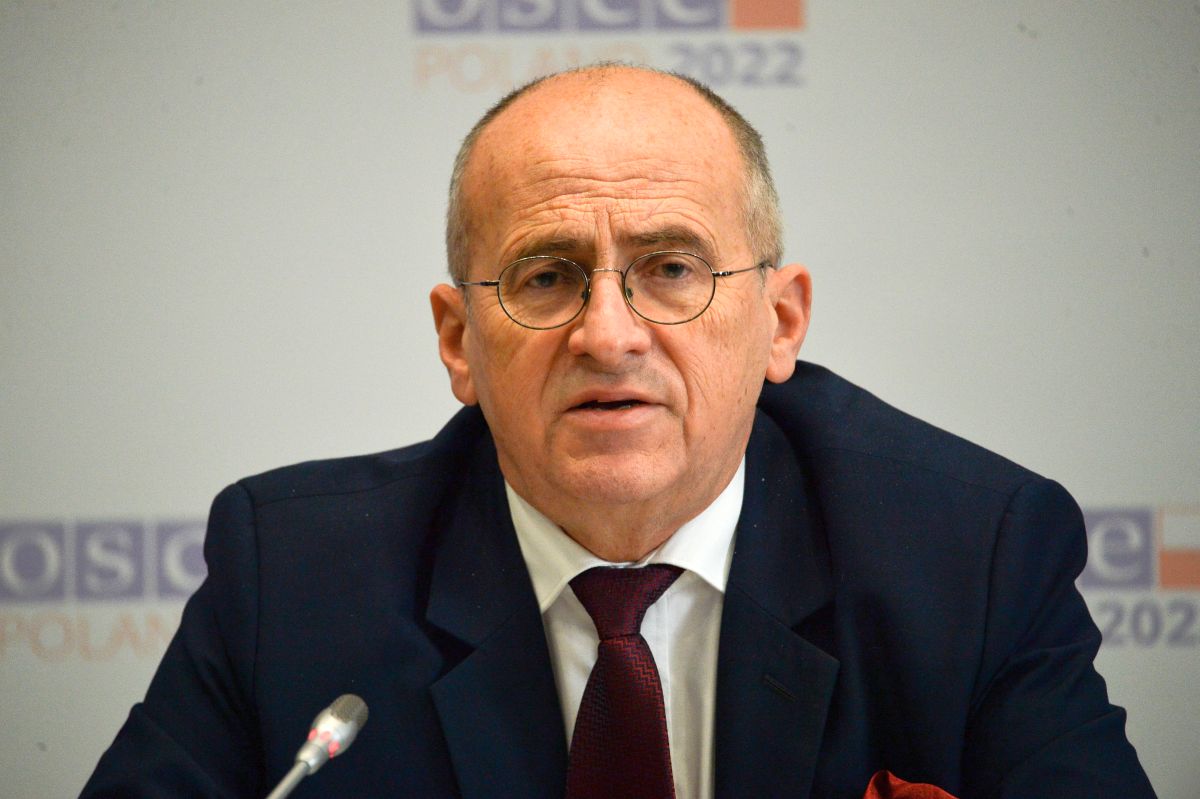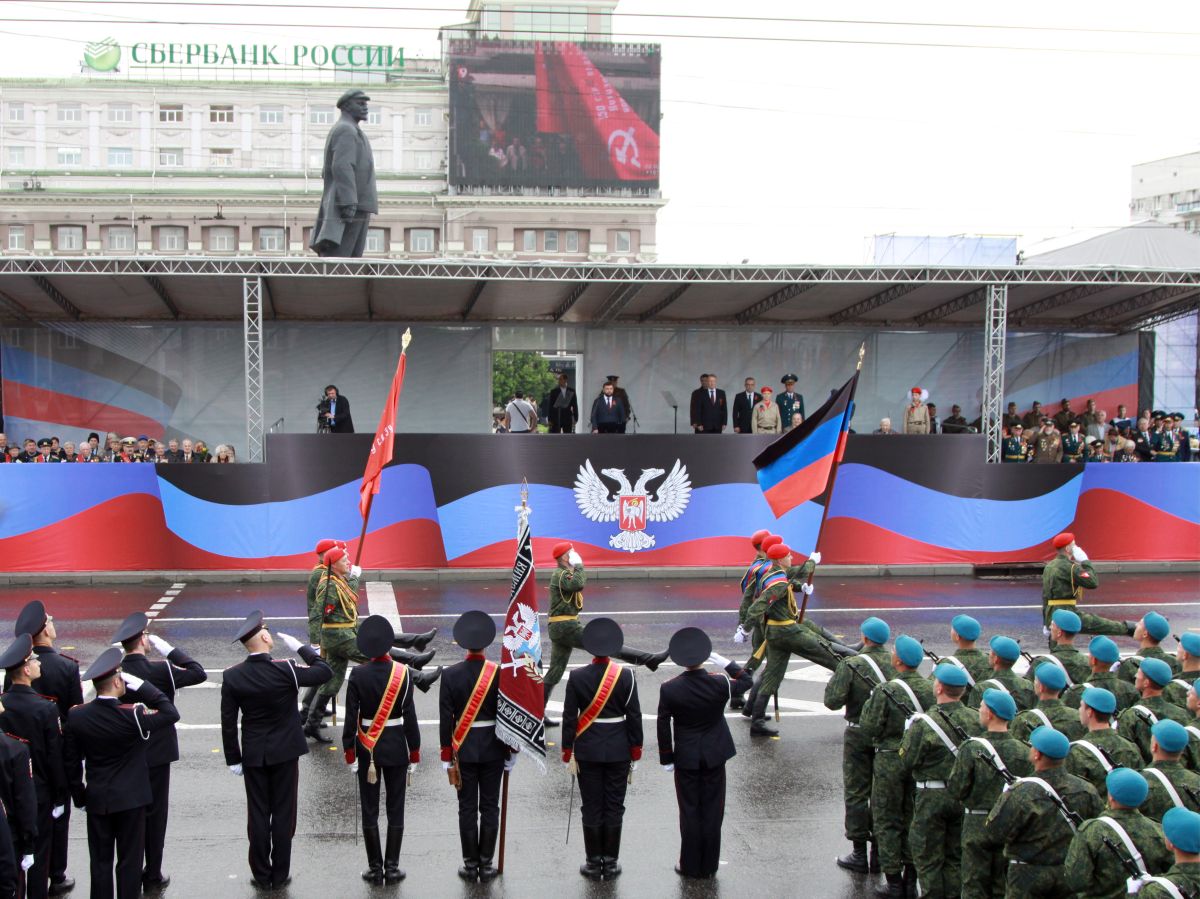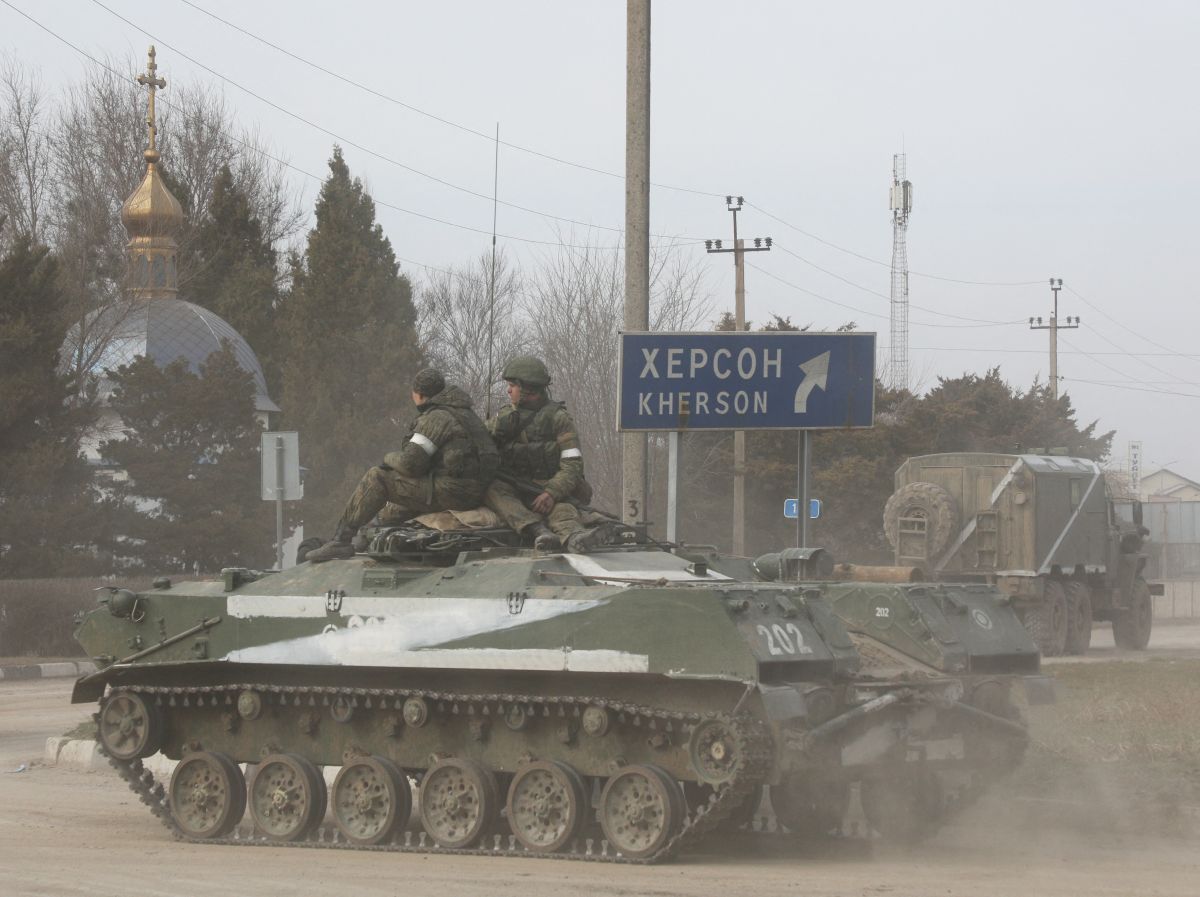The OSCE and the War in Ukraine
Russia’s attack on Ukraine, supported by Belarus, and Russia’s blocking of the extension of the mandate of the OSCE Special Monitoring Mission (SMM) in Ukraine calls into question the purpose of the organisation. Yet, despite the depreciating attitude of Russia and Belarus toward the organisation and its principles, the continuation of its work is necessary as a forum for contact and selective cooperation of the two countries with EU and NATO members, among other things. Poland’s chairmanship of the OSCE in 2022 demonstrates that it actively participates in shaping the functioning of the organisation.
 Maximilian Clarke/ Zuma Press/ FORUM
Maximilian Clarke/ Zuma Press/ FORUM
OSCE in Ukraine
The organisation has for years been associated with supporting the implementation of broad legal and economic reforms (the mission in 1994-1999, OSCE Project Coordinator from 1999). After the Crimea annexation in 2014, a Special Representative of the OSCE Chairperson-in-Office in Ukraine and in the Trilateral Contact Group was appointed. The representative acted in the latter—a format established to settle the conflict in Donbas—as a mediator between Russia, the separatists, and Ukraine and contributed to several ceasefires. But with Russia’s recognition of the so-called Donetsk and Luhansk People’s Republic (DNR, LNR) and its attack on Ukraine, the Trilateral Contact Group stopped functioning. The war also prevented the fulfilment of tasks of the civilian SMM, established in 2014, whose mandate covered the entire territory of Ukraine and including patrols in Donbas, reporting, and facilitating dialogue between the conflicting parties.
The OSCE and Russia and Belarus
Russia’s attitude towards the OSCE (formerly the CSCE) has worsened since the 1990s. It has accused Western countries of ignoring its proposals for the organisation’s development, focusing instead on strengthening and expanding NATO and the EU. It also claimed, among others, of alleged insufficient protection of the Russian minority in the Baltics and that the organisation favoured the interests of the Western group of states, giving too much attention to the human dimension—the protection of human rights and democracy. Most of the OSCE condemned Russia for blocking examination of crimes committed during the Second Chechen War, electoral violations, and suspension of participation in the Treaty on Conventional Armed Forces in Europe, among others. Russia has manifestly disregarded the OSCE principles contained in the Helsinki Final Act and the Charter of Paris for a New Europe, for example, by its military intervention in Georgia in 2008, the Crimea annexation in 2014, and the attack on Ukraine in 2022. Meanwhile, Russia has participated in OSCE formats to resolve conflicts in which it is involved in the post-Soviet area, including in Abkhazia and South Ossetia (Geneva International Discussions, GID), Transnistria (“5+2” format), and Nagorno-Karabakh (Minsk Group).
The relations with Belarus have also remained tense for years. In 1996, the OSCE Parliamentary Assembly questioned the mandate of the Belarusian representation due to the rigging of elections, with Alexander Lukashenka in turn accusing the OSCE Advisory and Monitoring Group in Belarus (1998-2002) of exceeding its mandate. Currently, the OSCE allegations against Belarus mainly concern the rigged presidential elections of 2020. Although in response 17 OSCE states, including Poland, established under the so-called Moscow mechanism a mission to investigate human rights violations in Belarus, its recommendations were not introduced by the Lukashenka regime. The OSCE also unsuccessfully called on him to engage in a dialogue with the democratic opposition and society.
OSCE and the War in Ukraine
In response to Russia’s recognition of the DNR and LNR, Poland, as OSCE Chairman-in-Office, convened an extraordinary meeting of the OSCE Permanent Council, and, after the attack on Ukraine, another meeting with an enhanced composition (ministers instead of ambassadors). In a series of joint statements, Polish Foreign Minister Zbigniew Rau and OSCE Secretary-General Helga Maria Schmid called on Russia for an immediate cessation of hostilities and condemned attacks on civilian objects. Since the outbreak of the war, the chairmanship has limited the consideration of other affairs, focusing on the situation in Ukraine within the framework of the Permanent Council and the Forum for Security Cooperation. The attack also dominated the UN-OSCE meeting on 14 March, at which Rau called for the strengthening of cooperation between the organisations.
Other OSCE bodies also regularly confer on the war. The representative on Freedom of Media condemns attacks on journalists in Ukraine, and repression and censorship of media in Russia. She also calls on the Russian authorities not to interfere with access to information and social media. The Office for Democratic Institutions and Human Rights (ODIHR) condemned the attacks on people involved in anti-war protests in Russia and Belarus and stressed the need to integrate and protect refugees. This supports the Office of the Special Representative and Coordinator for Combating Trafficking in Human Beings, which has issued recommendations to host countries.
Foreign OSCE personnel have been temporarily evacuated. Although in April the OSCE Project Coordinator returned to Ukraine, the reactivation of the SMM remains a problem. Due to Russia’s blocking the extension of the mission’s mandate after 31 March, the SMM carries out only administrative functions and its further role remains uncertain. Its activity was important because before the war, members of the mission were admitted, albeit not without difficulty, to the territories controlled by the separatists in Donbas (but not to Crimea). At present, access to verified information about the actual situation there is limited. The prospects for the renewal of the mandate are slim given Russia’s position and its attacks on the SMM in Mariupol.
On 13 April, the special OSCE expert mission published a report on violations of international humanitarian law (IHL), human rights, war crimes, and crimes against humanity committed in Ukraine since 24 February 2022. Experts found a pattern of IHL violations by Russian forces and the existence of evidence of violations of the right to life, the prohibition on torture, inhumane, and degrading treatment. Contrary to the unanimously approved SMM, the establishment of this mission was supported by 45 out of 57 countries (excluding Belarus, Central Asian republics, and others). Russia, which also opposed it, refused to cooperate with the experts. Yet, any allegations of OSCE bias would be unfounded; while the atrocities committed by Russia are incomparable to other violations, the experts examined the acts of both parties.
Perspectives
It is unrealistic to use the “consensus minus one” rule to implement political measures against a state that commits serious and mass violations of OSCE human rights principles. Although the rule could be used to suspend Russia’s membership in the OSCE, it would be blocked by Belarus. An attempt to decide whether to extend the interpretation of this rule to also exclude Belarus would risk vetoes by the Central Asia republics or others. In any case, excluding Russia would not be beneficial as it would deprive the OSCE states of one of the channels of contact and make it more difficult to cooperate with Russia in other peace processes (e.g., GID, “5+2”), which is already reduced after the actual limitation of the activities of the Minsk Group. The OSCE monitoring of human rights violations in Russia would also suffer, especially in view of its non-participation in the Council of Europe (CoE). This also speaks in favour of keeping Belarus in the OSCE and maintaining the organisation as such. The more so as the activities of the OSCE and its bodies (e.g., ODIHR) in the field of the human dimension remain important for supporting reforms and civil society, for example, in the Central Asian republics.
Also, Ukraine’s use of the OSCE inter-state dispute resolution mechanism, the Court of Conciliation and Arbitration, is not realistic. Russia did not ratify the relevant convention and thus it would be necessary for both countries to conclude an agreement entrusting the court with resolution of the dispute. In addition, war-related complaints have already been brought before other international tribunals, including the International Court of Justice. The OSCE reports, however, will serve to bring the perpetrators of the crime to account.
Conclusions. Despite its marginalisation and the hindering of its functioning by Russia, the OSCE remains one of the few communication forums between Western countries and Russia and Belarus. It enables an ongoing security dialogue and cooperation on missions and peace processes. The non-renewal of these joint initiatives could deepen the challenges for regional stability and security. This discourages OSCE states from excluding Russia from the organisation. Russia may be interested to remain in the OSCE to influence the organisation and because it can benefit from its mode of operation involving consensual decision-making with respect to the most important issues, such as political agreements (not legally binding), and lack of severe consequences for participants failing to meet their obligations.
The Polish chairmanship has rightly adopted a firm stance on the actions of Russia and Belarus, advocating compliance with the OSCE principles. Through its chairmanship of the organisation, Poland is setting the tone of the discussion and may undertake initiatives aimed at, among others, sustaining the existence of the SMM. Its position is strengthened by the fact that since the beginning of the war, it has been active in the diplomatic and humanitarian fields.





